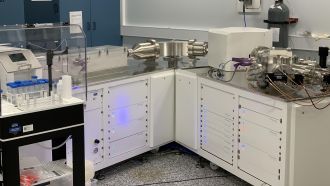News release
From:
New research has discovered a unique and promising avenue for diagnosing Alzheimer’s disease (AD) earlier – by analysing AD biomarkers in blood – so that the impacts of dementia can be reduced.
AD is the most common form of dementia, estimated to contribute to 60-70 per cent of cases, or more than 33 million cases worldwide, according to the World Health Organisation. Currently incurable, AD is usually diagnosed when a person is having significant difficulties with memory and thinking that impact their daily life.
University of Melbourne researcher Dr Brandon Mahan leads a group of analytical geochemists from the Faculty of Science who are collaborating with neuroscientists in the Faculty of Medicine, Dentistry and Health Sciences (based at The Florey) to develop a blood test for earlier diagnosis of AD, as described in a paper published in Metallomics.
In a world first, the researchers applied inorganic analytical geochemistry techniques, originally developed for cosmochemistry – for example, to study the formation and evolution of the Earth, the Moon, other planets and asteroid samples – and adapted these highly sensitive techniques to search for early biomarkers of AD in human blood serum.
They compared the levels of potassium isotopes in blood serum in 20 samples – 10 healthy and 10 AD patients from the Australian Imaging, Biomarker and Lifestyle study and biobank.
“Our minimally invasive test assesses the relative levels of potassium isotopes in human blood serum and shows potential to diagnose AD before cognitive decline or other disease symptoms become apparent, so action can be taken to reduce the impacts,” Dr Mahan said.
“Our test is scalable and – unlike protein-based diagnostics that can break down during storage – it avoids sample stability issues because it assesses an inorganic biomarker.”
Currently, clinical diagnosis of AD is based on medical history, neurological exams, cognitive, functional and behavioural assessments, brain imaging, and protein analysis of cerebrospinal fluid or blood samples.
“Earlier diagnosis would enable earlier lifestyle changes and medication that can help slow disease progression and would allow more time for affected families to take action to reduce the social, emotional and financial impacts of dementia,” Dr Mahan said. “It could also make patients eligible for a wider variety of clinical trials, which advance research and may provide further medical benefits.
“My research team – the Melbourne Analytical Geochemistry group – seeks partners and support to continue this important research and development.”
Co-author Professor Ashley Bush from The Florey sees promise in the results from the small pilot study.
“Our blood test successfully identified AD and shows diagnostic power that could rival leading blood tests currently used in clinical diagnosis,” Professor Bush said. “Significant further work is required to determine the ultimate utility of this promising technique.”
With the world’s population aging, incidence of AD is rising. The number of dementia sufferers is anticipated to double every 20 years and the global cost of dementia is forecast to rise to US$2.8 trillion by 2030. In 2024, more than 421,000 Australians live with dementia. It is the second leading cause of death in Australia and the leading cause for Australian women.
Multimedia




 Australia; International; VIC; QLD
Australia; International; VIC; QLD



